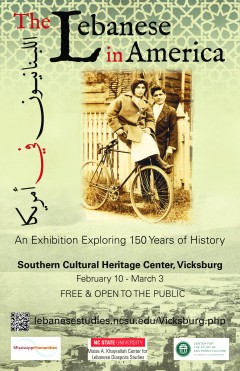Vicksburg Exhibit and Community Oral History Workshop Highlight Lebanese American Community and Culture
Vicksburg Exhibit and Community Oral History Workshop Highlight Lebanese American Community and Culture
 The Center for the Study of Southern Culture and the Moise A. Khayrallah Center for Lebanese Diaspora Studies at North Carolina State University are pleased to announce a collaborative effort to engage, learn from, and explore the history and memories of Mississippi’s Lebanese American community.
The Center for the Study of Southern Culture and the Moise A. Khayrallah Center for Lebanese Diaspora Studies at North Carolina State University are pleased to announce a collaborative effort to engage, learn from, and explore the history and memories of Mississippi’s Lebanese American community.
The project includes a month-long residency of The Lebanese in America traveling exhibit from February 10 to March 3 at the Southern Cultural Heritage Center in Vicksburg, including an opening reception on Friday, February 17, and a community oral history workshop, panel discussion, and film screening on Saturday, February 18.
The Lebanese in America traveling exhibit comprises eight narrative panels with photographs, graphics, and QR codes linked to supplementary materials and an e-reader. The panels describe the history, conditions, and impact of Lebanese immigration nationally, offering a framework in which to consider the substantial Lebanese immigration to the Mississippi Delta and beyond between the 1880s and the end of World War I. The exhibit opens the weekend prior to the fifty-seventh annual Lebanese Dinner hosted by St. George Antiochian Orthodox Church in Vicksburg, which will be held on Monday, February 13. St. George is the oldest Syrian-Lebanese Orthodox congregation in Mississippi.
The community oral history workshop will include speakers and interactive discussion on such topics as conducting family oral histories, ethical considerations in oral history, digitization and archiving techniques, and using oral history as a tool to explore the particular shared histories and experiences of Lebanese Americans in Mississippi and throughout the South. There also will be a screening and discussion of the documentary Cedars in the Pines, which documents Lebanese immigrant experience in North Carolina through oral history and photography.
The significant contributions of individuals of Lebanese and Syrian descent in Mississippi have been studied and celebrated in many ways, including those of the folk art of Ethel Wright Mohamed, which chronicles her married life with Lebanese merchant Hassan Mohamed, the role of Natchez mayor John J. Nosser during the civil rights era, and the historic tenure of Chancellor Robert Khayat at the University of Mississippi. This project continues examining the multigenerational history and present-day experience of Syrian and Lebanese immigrants and their descendants in the state.
“We hope this month-long event will serve as the pilot for a larger, participatory oral history, documentary, and archival project to better understand and make visible the Lebanese immigrant experience in Mississippi across the generations,” said the Center’s James G. Thomas, Jr., whose great-grandparents immigrated to Mississippi from Lebanon in the late 1800s. His work on Lebanese immigration to the state has been published in Southern Cultures and in Ethnic Heritage of Mississippi: The Twentieth Century.
“Our immediate goal is to provide a forum for community members to gain a deeper understanding of their shared histories and experiences,” said Akram Khater, director of the Khayrallah Center. “We plan to use the workshop opportunity to gage community interest in additional project components, such as a web-based oral history archive, a regionally focused documentary, or a curated regional museum-quality exhibit.”
Supported in part by the Mississippi Humanities Council, the exhibit, opening reception, and the workshop will be free and open to the public, though workshop registration is encouraged for planning purposes. Workshop materials will be provided. For more information, see the attached detailed agenda or visit lebanesestudies.ncsu.edu/Vicksburg.php.
